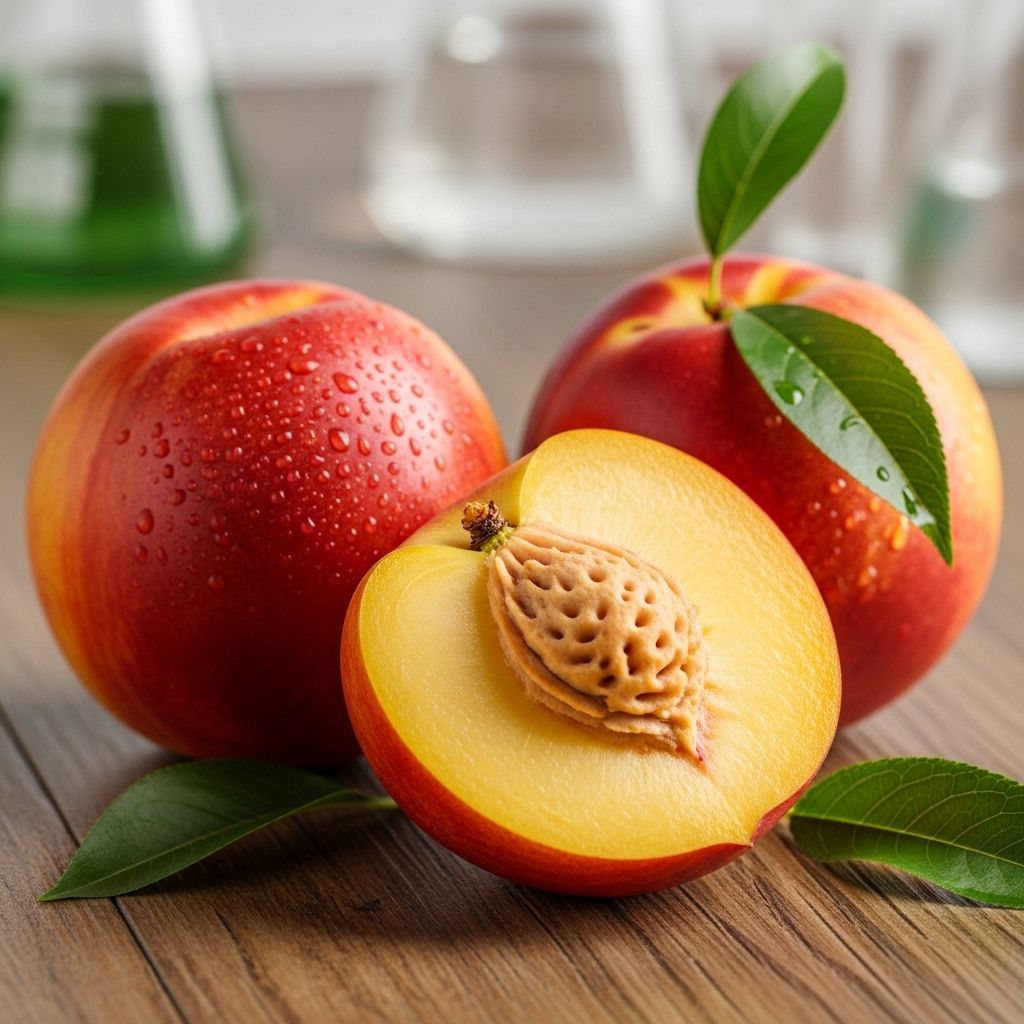Amazing Health Benefits Of Nectarines: Nutrition, Wellness, and Uses
A juicy summer snack that delivers fiber, antioxidants, and hydration in every bite.

Nectarines, the smooth-skinned cousins of peaches, are more than just a sweet summer treat. Packed with fiber, vitamins, minerals, and powerful antioxidants, these stone fruits offer a myriad of health advantages ranging from better weight management to improved skin health and immune function. Read on to discover the full spectrum of nectarine benefits, their nutritional value, and practical tips for including them in your diet.
Table of Contents
- Nectarine Nutrition Facts
- Top Health Benefits Of Nectarines
- How To Use Nectarines in Your Diet
- Frequently Asked Questions (FAQs)
Nectarine Nutrition Facts
Nectarines are composed of water, fiber, natural sugars, and a trove of essential nutrients. Their nutritional profile is responsible for most of the benefits associated with their consumption.
| Nutrient | Amount | % Daily Value |
|---|---|---|
| Calories | 63 | — |
| Carbohydrates | 15 g | 5% |
| Total Fat | 0.5 g | 1% |
| Fiber | 2.4 g | 9% |
| Sugar | 11.2 g | — |
| Protein | 1.5 g | 3% |
| Vitamin C | 7.7 mg | 9% |
| Niacin (B3) | 1.6 mg | 10% |
| Potassium | 285 mg | 6% |
| Copper | 0.122 mg | 14% |
| Lutein + Zeaxanthin | 185 µg | — |
Besides these, nectarines contain small but valuable amounts of vitamins A, E, several other B vitamins, manganese, magnesium, zinc, and iron. Their phytochemical content—such as anthocyanins and beta-carotene—offers additional protective effects.
Top Science-Backed Health Benefits Of Nectarines
Thanks to their micronutrient, fiber, and antioxidant content, nectarines provide a range of evidence-based health advantages. Here are the major benefits explained in depth:
1. Promote Weight Management
- Low-Calorie Content: With about 44–63 calories per serving, nectarines deliver sweetness without piling on excess calories or fat, making them an ideal snack for weight watchers.
- Rich in Fiber: Their insoluble and soluble fiber (roughly 2.4 g per serving) enhances satiety, helping curb overeating and promoting healthy bowel movements.
- Natural Sweetness: The natural sugars in nectarines satisfy a sweet tooth and often serve as a healthier alternative to high-sugar desserts, helping reduce overall sugar intake.
2. Support Skin Health And Appearance
- Vitamin A: Supports healthy cell growth and skin regeneration, keeping the skin vibrant and strong.
- Copper: Aids melanin production for even skin tone and provides antioxidant protection against environmental damage.
- Vitamin C: Essential for collagen synthesis, which promotes plump, resilient skin with fewer fine lines.
- Antioxidants: Anthocyanins, lutein, and zeaxanthin protect against photoaging and environmental stressors.
3. Reduce Blood Pressure
- Potassium: Assists in moderating sodium levels and relaxing blood vessel walls, which helps lower high blood pressure and supports heart health.
- Low Sodium: Nectarines are naturally low in sodium, making them heart-friendly for blood pressure management.
4. Strengthen Immunity
- Vitamin C: Increases white blood cell output, supporting the immune system’s ability to fend off pathogens and reduce infection risk.
- Antioxidant Defense: The fruit’s antioxidants protect immune cells from oxidative stress, contributing to robust immune function.
5. Aid Digestion And Gut Health
- Dietary Fiber: Supports regular bowel movements, prevents constipation, and encourages the growth of beneficial gut bacteria for overall digestive wellness.
- Balanced Gut Flora: The presence of both soluble and insoluble fibers nurtures a balanced microbiome, reducing digestive troubles and supporting nutrient absorption.
6. Enhance Longevity (Potentially)
- Anti-Aging Antioxidants: Antioxidants in nectarines reduce free radical damage, a key factor that contributes to cellular aging and age-related diseases.
- Animal Studies: Research suggests nectarine consumption may extend lifespan in animal models by improving oxidative stress resistance and metabolic health, though more human studies are needed.
7. May Help Prevent Cancer
- Phytochemicals: Plant compounds like anthocyanins, beta-carotene, and vitamin C possess strong antioxidant and anti-inflammatory properties, which are linked to a lower risk of cell mutation and some cancer types.
- Preliminary Evidence: Some lab and animal research shows promise in nectarine extracts interrupting cancer pathways, but more clinical evidence is required.
8. Support Eye Health
- Lutein and Zeaxanthin: These carotenoids filter harmful high-energy light and reduce oxidative damage in the eyes, supporting long-term eye health.
9. Beneficial in Pregnancy
- Folic Acid and Vitamin C: Promote fetal development, cell growth, and iron absorption, making nectarines a smart inclusion during pregnancy.
10. Hydrating Snack
- High Water Content: Nectarines contain up to 87% water, helping maintain hydration during hot summer days.
Other Notable Health Highlights
- Gluten-Free and Allergen Friendly: Naturally free from gluten and common allergens.
- Versatile and Easy to Include: Perfect in salads, smoothies, salsas, or as an on-the-go snack.
How To Use Nectarines In Your Diet
Nectarines are delicious and versatile fruits that can be easily added to many dishes. Here are some creative ideas:
- Fresh Snack: Enjoy sliced nectarines alone or paired with a handful of nuts for balanced nutrition.
- Sweet or Savory Salads: Toss fresh nectarine slices with leafy greens, goat cheese, and walnuts.
- Breakfast Bowls: Add chopped nectarines to oatmeal, yogurt, or smoothie bowls.
- Salsas: Dice nectarines with tomatoes, onions, cilantro, and lime for a refreshing salsa perfect atop grilled fish or chicken.
- Baked Treats: Incorporate into tarts, galettes, or healthy muffins for a naturally sweet twist.
- Grilled: Halved and grilled nectarines bring a new flavor layer, wonderful with ricotta or balsamic glaze.
Choosing, Storing, and Precautions
- Selection: For best taste, pick nectarines that are fragrant, slightly soft, and free of blemishes or wrinkles.
- Storage: Store ripe nectarines in the refrigerator; unripe fruit will ripen at room temperature in a paper bag.
- Allergies/Cautions: Though rare, stone fruit allergies are possible. Wash nectarines well, or peel to reduce pesticide residue.
Frequently Asked Questions (FAQs)
Q: What makes nectarines different from peaches?
A: Nectarines are genetically almost identical to peaches, but they have smooth skin, while peaches have fuzzy skin. Both offer similar nutritional and health benefits.
Q: Are nectarines good for diabetes?
A: Nectarines have a moderate glycemic index and provide fiber, which helps manage blood sugar. They can be part of a diabetes-friendly diet when eaten in moderation.
Q: How should I store nectarines for maximum freshness?
A: Store ripe nectarines in the refrigerator and enjoy within a week. If they are not yet ripe, let them soften at room temperature before chilling.
Q: Can I eat the skin of nectarines?
A: Yes, nectarine skin is edible and contains additional fiber and nutrients. Wash thoroughly before eating to reduce residue.
Q: Are nectarines safe for everyone?
A: Most people can enjoy nectarines safely. However, those with stone fruit allergies should avoid them. Rinse well or peel if sensitive to pesticides or digestive discomfort.
Q: Are nectarines good for weight loss?
A: Absolutely. Their low calorie, high fiber nature makes them satisfying while helping reduce overall caloric intake.
Q: Do nectarines have anti-aging benefits?
A: Antioxidants and vitamin C in nectarines protect against free radical damage and support skin health, offering anti-aging benefits as part of a healthy lifestyle.
Conclusion
Nectarines are far more than a tasty seasonal delight. With their spectacular blend of fiber, vitamins, minerals, and antioxidants, they offer a variety of benefits—from supporting weight control and skin health to lowering blood pressure and bolstering immunity. Enjoy them in countless ways for a daily nutritional boost and a step toward better health.
References
- https://www.medicalnewstoday.com/articles/nectarine-benefits
- https://www.healthline.com/nutrition/nectarine-benefits
- https://www.signos.com/foods/nectarine-glycemic-index
- https://health.clevelandclinic.org/nectarine-benefits
- https://fcs.osu.edu/sites/fcs/files/imce/PDFs/SNAP_Ed_newsletter_nectarines.pdf
- https://ackermancancercenter.com/the-health-benefits-of-nectarines-and-peaches/
Read full bio of medha deb












